Motorcycle Investor mag
Subscribe
to our free email news
Superbike for
the road
When
Harley-Davidson’s ultra-rare harlequin 1990s superbike
scored headlights
November 2025 – Chris Beattie
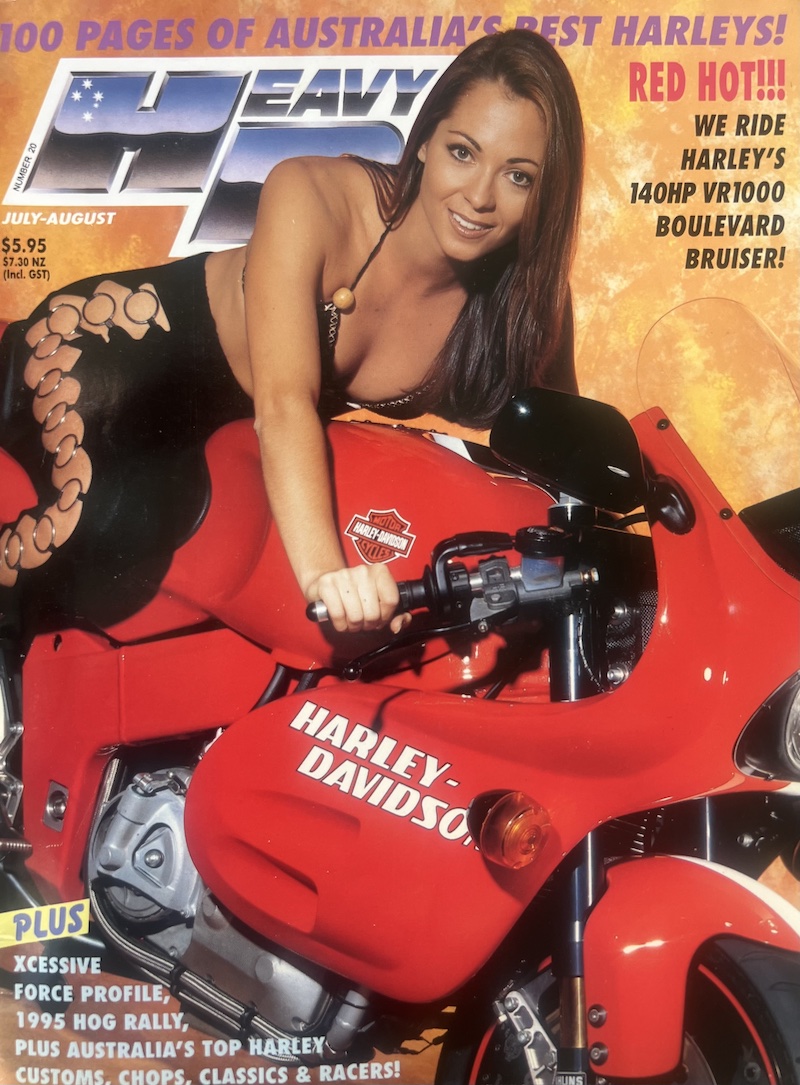
It's 1995 and Heavy Duty magazine happily reveals
that "behind the indicators and lights of Harley’s VR1000
‘roadster’ beats a heart of pure, race-bred muscle".
Meet the ultra-rare homologation version of the racer
Story: Chris Beattie, founder of Heavy Duty mag;
Pics Ken Schultz
(Note: thanks to Tony Blain. This was a world exclusive for little ole Heavy Duty mag at the time!)
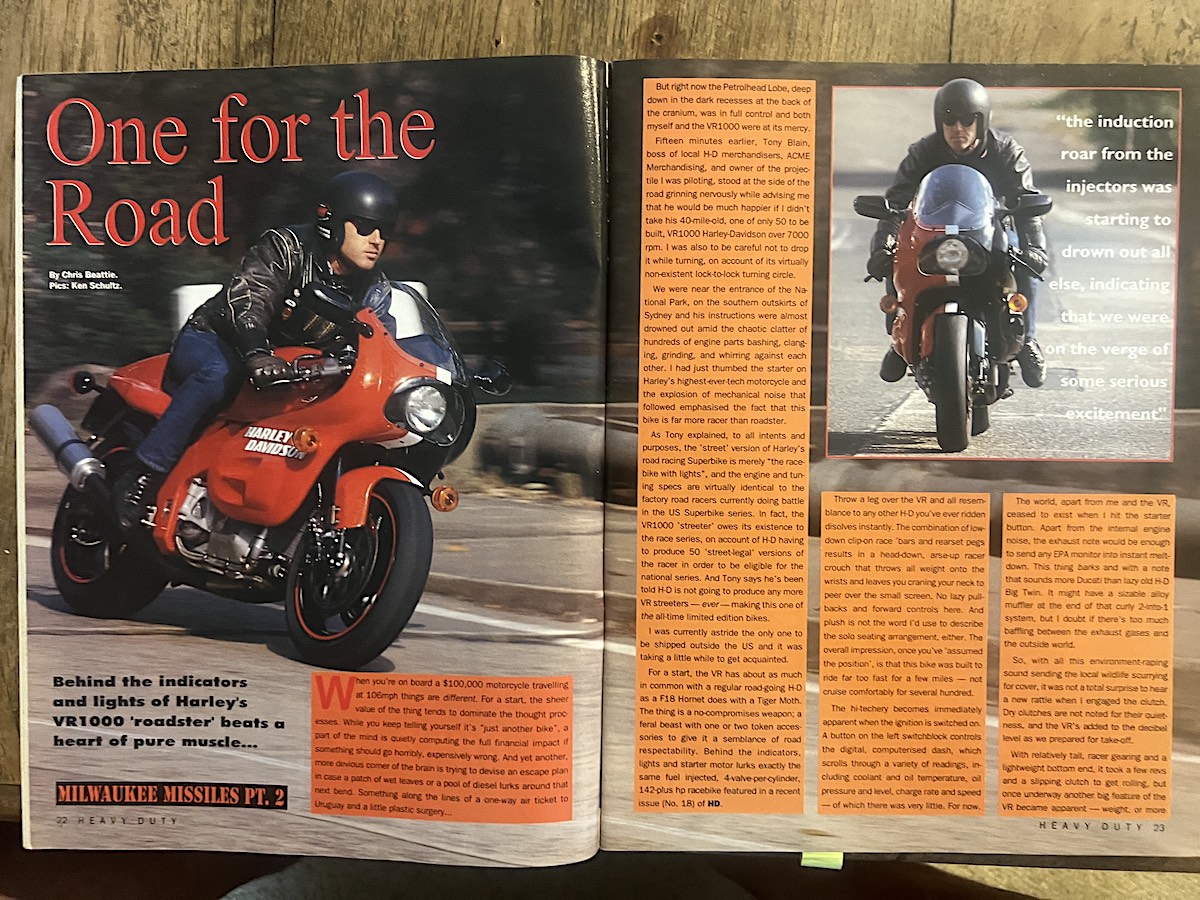
When you’re on board a US$100,000 motorcycle travelling at 106mph (and this is back in 1995, when it was the price of a house) on a very curly road things are different. For a start, the sheer value of the thing tends to dominate the thought processes. While you keep telling yourself it’s “just another bike”, a part of the mind is computing the full financial impact if something goes horribly, expensively wrong. And yet another more devious corner of the brain is trying to devise an escape plan in case a patch of wet leaves or diesel lurks around that next corner. Something along the lines of a one-way trip to Uruguay and a little plastic surgery.
But right now the Petolhead Lobe, deep down in the dark
recesses at the back of the cranium, was in ascendency and
both the VR1000 and I were at its mercy.
Fifteen minutes earlier, Tony Blain, the boss of local H-D
merchandiser, ACME Merchandising and owner of the
projectile I was piloting, stood at the side of the road
grinning nervously while advising me that he would be much
happier if I didn’t take his 40-mile-old, one of only 50
to be built, new VR1000 over 7000rpm. I was also to be
very careful not to drop it while turning, given its
virtually non-existent steering lock range.
We were near the entrance to the national park on the
southern outskirts of Sydney and his instructions were
almost drowned amid the chaotic clatter of hundreds of
engine parts reciprocating and whirring inside the
crankcases. I had just thumbed the starter on Harley’s
highest-ever tech motorcycle and the explosion of
mechanical noise that followed emphasised the fact that
this bike is far more racer than roadster.
As Tony explained, to all intents and purposes, the
‘street’ version of Harley’s road racing Superbike is
merely “the racebike with lights”, and the engine and
tuning specs are virtually identical to the factory road
racers currently doing battle in the US Superbike Series.
In fact, the VR1000 streeter owes its existence to the
race series, on account of H-D having to produce 50
‘street-legal’ versions of the racer in order to be
eligible for the domestic series. And Tony says he’s been
told H-D is not going to produce any more VR streeters –
ever – making this one of the all-time limited edition
road bikes.
I was currently on the only one to be shipped outside the US and it was definitely taking a little while to get acquainted.
For a start, the VR1000 has about as much in common with a regular road-going H-D as a F18 Hornet does with a Tiger Moth. This thing is a no-comprises weapon; a feral beast of a bike with one or two token add-ons to give it a semblance of road respectability. Behind the indicators, lights and starter motor lurks exactly the same fuel-injected, 4-valve, 142-plus-hp racebike as ridden by Heavy Duty contributor Alan Cathcart and which appeared in a recent issue.
Throw a leg over the VR and any resemblance to any other Harley I’ve ridden instantly dissolved. The combination of low-down clip-on race ‘bars and rearset pegs results in a head-down, arse-up, racer crouch that throws all weight onto the wrists and forces you to crane your neck to peer over the small screen. No lazy pullbacks and forward controls here. And plush is not the word I’d use to describe the solo seating arrangement, either. The overall impression, once you’ve ‘assume the position’, is that this bike was built to ride far too fast for a few miles – not cruise comfortably for several hundred.
The high-techery becomes immediately apparent when the ignition is switched on. A button on the left switch block controls the digital dash, which scrolls through a variety of functions, including coolant and oil temperatures, oil pressure and level, charge rate and speed – of which there was none. For now.
The world, apart from the VR and I, ceased to exist when
I hit the starter button. Apart from the internal engine
noise, the exhaust note would be enough to send any EPA
monitor into meltdown. This thing barks, and with a note
that sounds more Ducati than lazy old Harley Big Twin. It
might have a sizeable alloy muffler at the end of that
curly 2-into-1 system, but I doubt if there’s too much
baffling between the exhaust gases and the atmosphere.
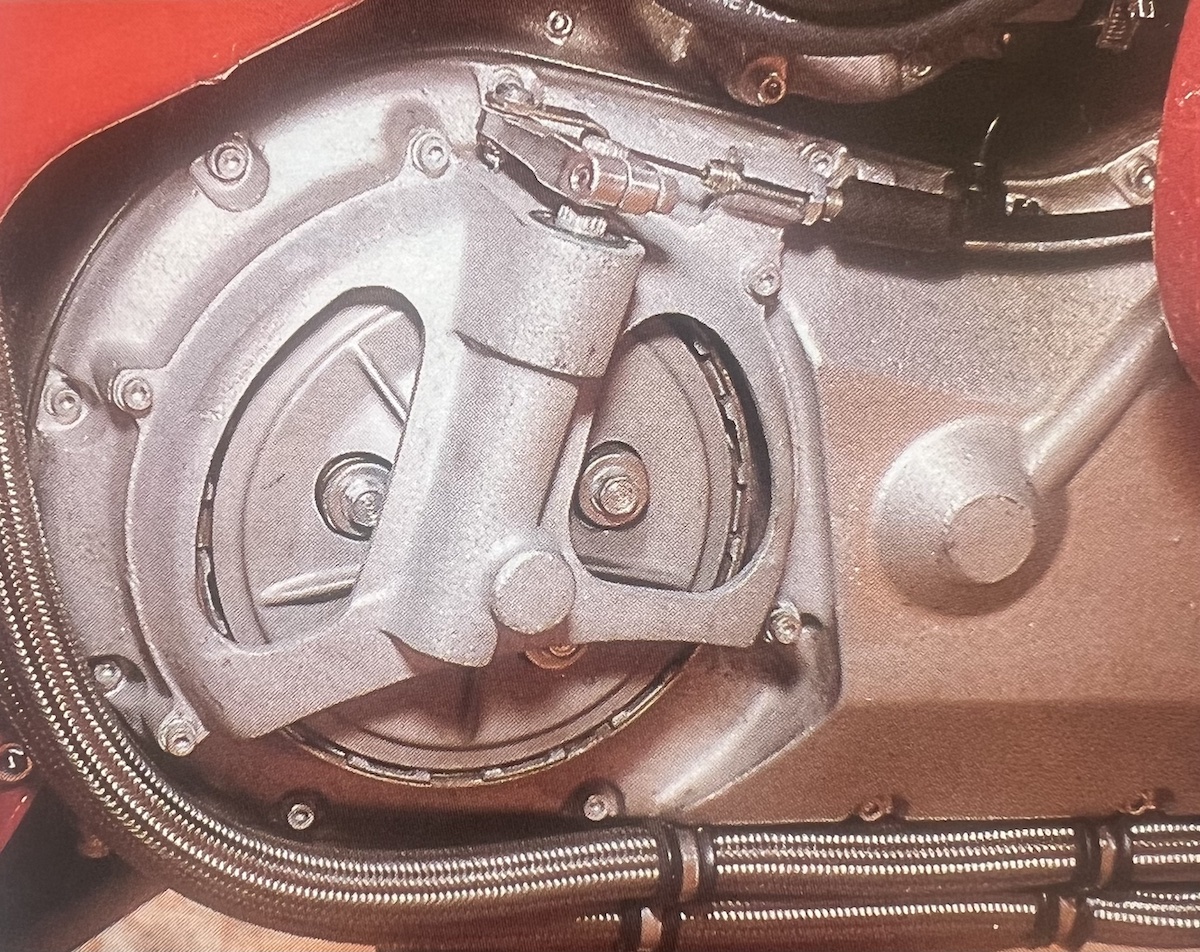
So, with all this environment-raping savagery sending the local wildlife scurrying for cover, it was not a total surprise to hear a new rattle when I engaged the clutch. Dry clutches are not noted for their quietness, and the VR’s added to the decibel level as we prepared for take-off.
With relatively tall racer gearing and a lightweight
bottom end, it took a few revs and a slipping clutch to
get it rolling, but once underway another big feature of
the VR became apparent. Weight, or more precisely the vast
lack of it. Thanks to extensive use of aluminium and
carbon fibre, the VR weighs only 177kg dry, which is
around a fridge-full of VBs – or 45kg lighter than
Harley’s lightest production bike, the 883cc Sportster.
And with more than three times the power. Imposing
arithmetic and immediately apparent on the road.
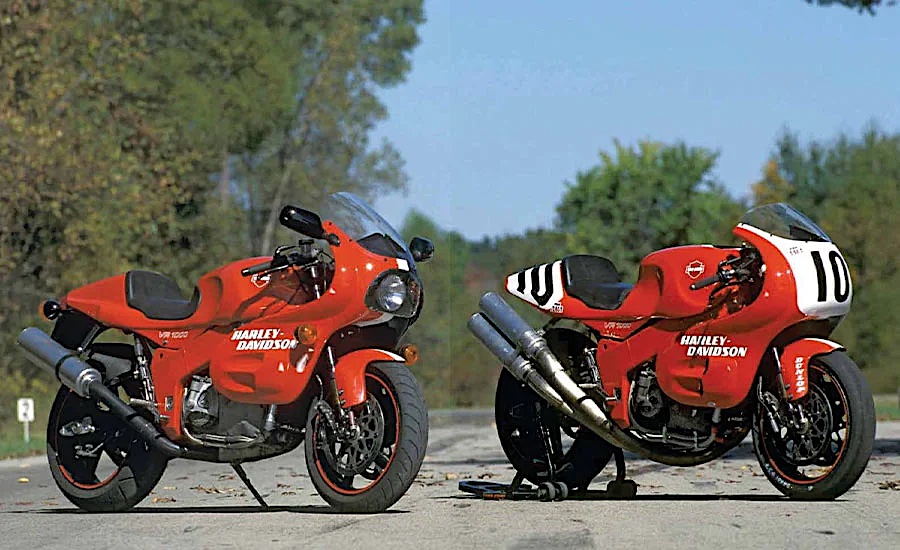
Grab a handful of throttle and the scenery instantly blurs. The 250 road bike-like weight and gobs of grunt results in a bike that lunges forward the microsecond the throttle is opened. The Weber fuel injection helps here, with clean pulling power and torque available from around 4000rpm. With a Tony-imposed limit of 7000rpm (redline of 10,200rpm), I wasn’t about to explore the upper reaches, but I can state categorically that the motor felt like it wanted to go well beyond, an impression supported by its well-over-square 98mm x 60mm bore/stroke ratio. In fact, at just below 7000rpm, the induction roar from the injectors was starting to drown out all else, indicating that we were on the verge of some serious excitement, circumstance permitting.
Which brings me back to that 106mph I mentioned earlier. At that precise moment in time, I was rapidly (far too) approaching the end of a short straight when I happened to glance at the digital display, which was around a centimetre from my rapidly expanding eyeballs as I lay hunkered down behind the screen. The idea was to give it a brief blast to see what it felt like at speed. At first, the ton-plus readout was accepted by the brain as km/h and I was suitably impressed given the couple of seconds to get there from 60km/h. Then the eyes registered the “mph” and with a tight left-hander approaching far too fast, my well-developed sense of fear took over. Luckily, I had 12 brake pistons between me and acute embarrassment, and I used every damn one of them to restore a semblance of sanity to the situation.
Acceleration, from the point of view of a mere mortal
like myself, is in the ‘pharking phenomenal’ category –
even in comparison to some lesser brand multi-cylinder
rocketships I’ve ridden over the years – and would serve
to create both fear and respect in anyone but the entirely
insane (that’s anyone who actually wants to race on of
these things).
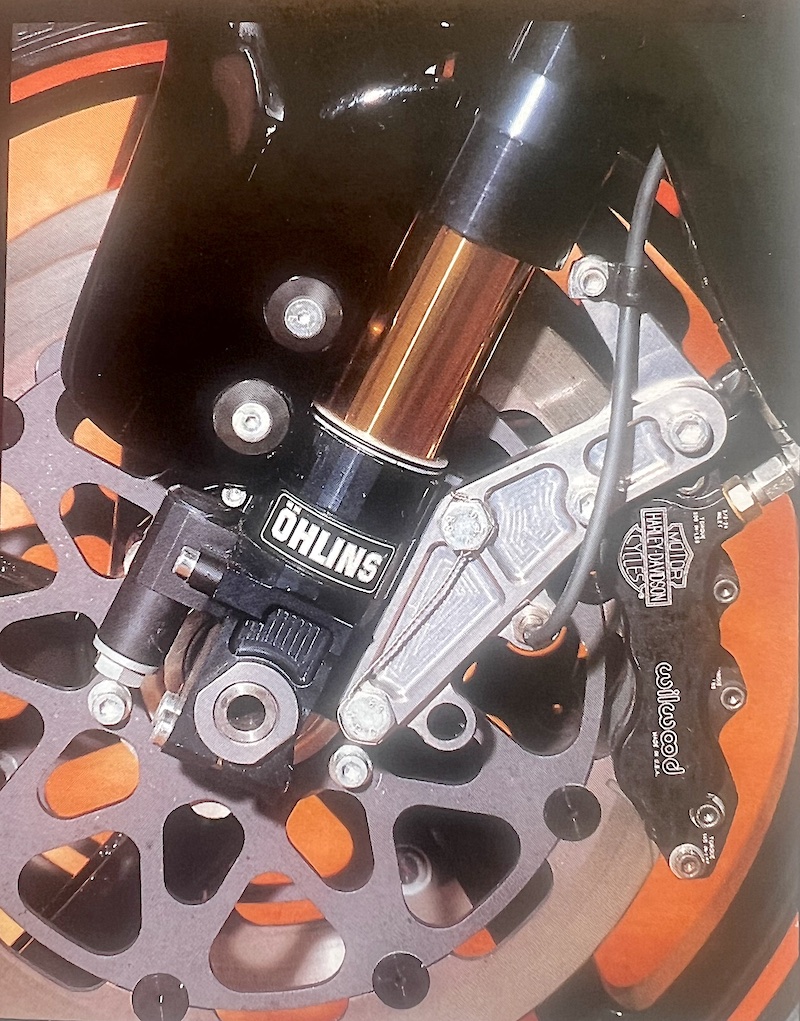
Braking, fortunately, is something the VR1000 does almost as well, with a pair of Wilwood 6-piston clamps bringing everything to a far more sedate pace well in time for the next bend. And bends is what the VR is all about.
It took around two corners for me to realise that my 13-plus years of Harley riding had definitely not prepared me for the VR. The old ‘haul on the brakes, stomp on the gearshift and wrestle the bars down into the turn’ routine almost had me and the VR coming to a premature parting of the ways on account of this bike barely needing a rider to get through a corner. The steering is so neutral and light that it just falls into corners and goes abso-bloody-lutely exactly where it’s pointed. At any speed and on any turn the VR is completely at ease, the only limit to outright cornering velocity being the rider. And traction, of which there is plenty, is confidence-inspiring to say the least given the size of the stock Dunlop rubber and the sure-footedness of the suspension.
Up front is a set of Ohlins inverted forks, while a
Penske shocker (from the Indycar race team) keeps the rear
wheel under control. All 100 per cent race-bred hardware.
Far too quickly – like everything else about the VR, come
to think of it – my ride was over, although I had to admit
to being relieved that a one-way flight to Uruguay
wouldn’t be needed after all.
With the adrenalin level subsiding, it occurred to me to ask Tony just what he intended doing with his own personal $100k factory superbike, especially given the kind of ‘vague’ legality of this street version of the racebike.
“Right now, as a committed Harley enthusiast, I just want
to share it with other Harley people and maybe take it to
a few bike shows and let people enjoy seeing it,” he said.
Beyond that, the only VR1000 streeter to be shipped
outside the US might also be seen from time to time
weaving through the curly roads around Sydney when the
mood takes him (like on a full moon). And just in case it
gets a bit lonely, Tony reckons he might find a couple of
companions for his collectible rarity.
“The ultimate wish list might also include two VR1000
racebikes and an entry in the Australian Superbike series,
but the one I’ve got is more than enough for the time
being. We’ll just wait and see…”
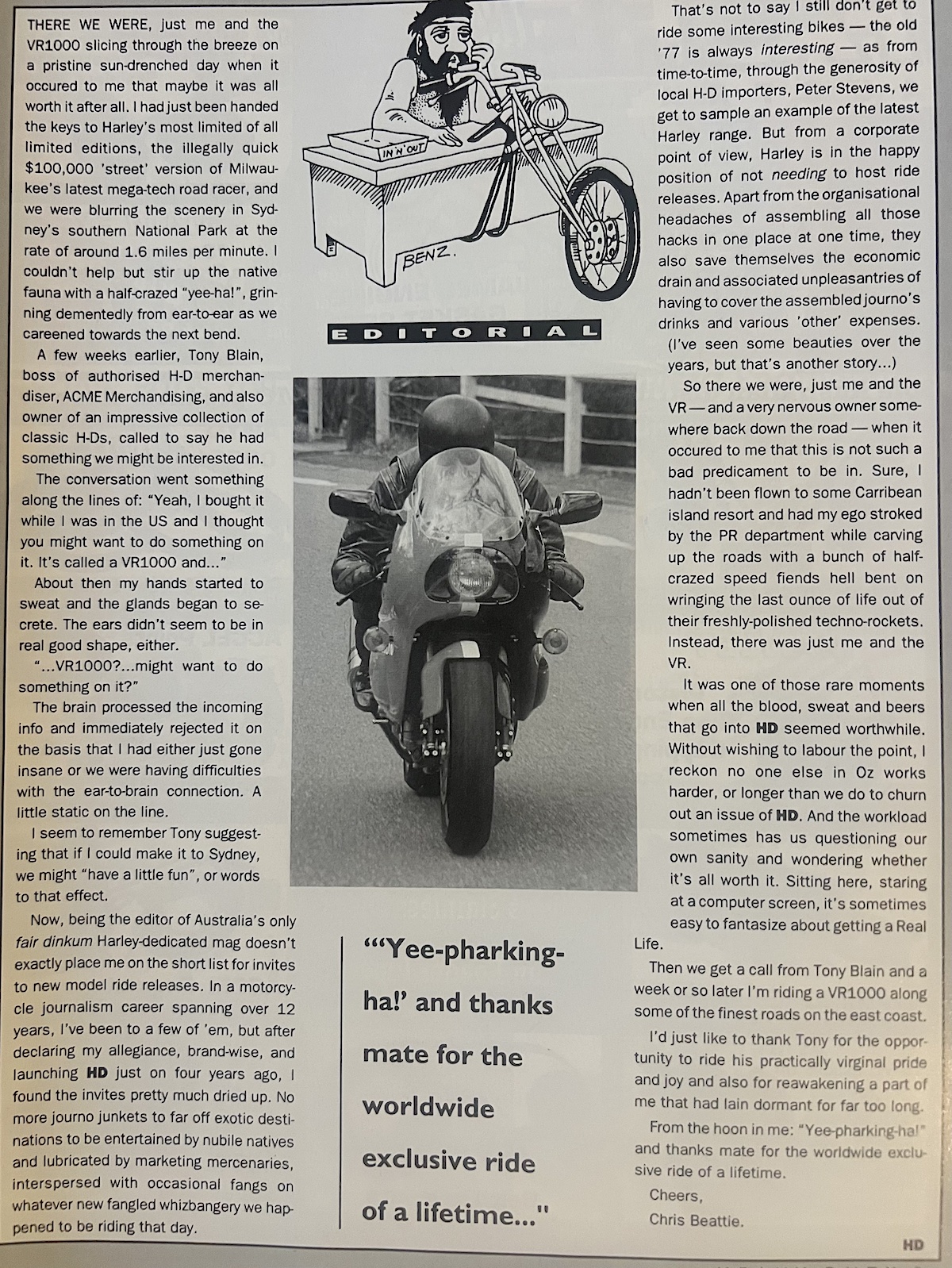
Above: the Heavy Duty mag editorial page from back in the day – it was a big deal to get your hands on such a special machine.
See Heavy Duty magazine's
excellent current website
***
-------------------------------------------------
Produced by AllMoto abn 61 400 694 722
Privacy: we do not collect cookies or any other data.
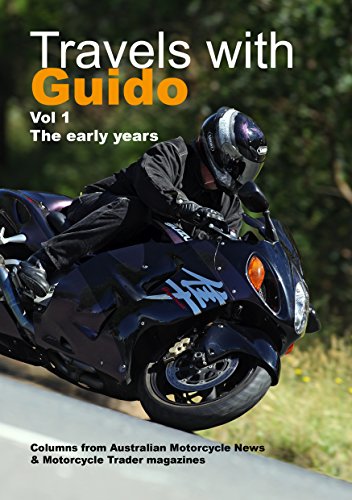
Archives
Contact




